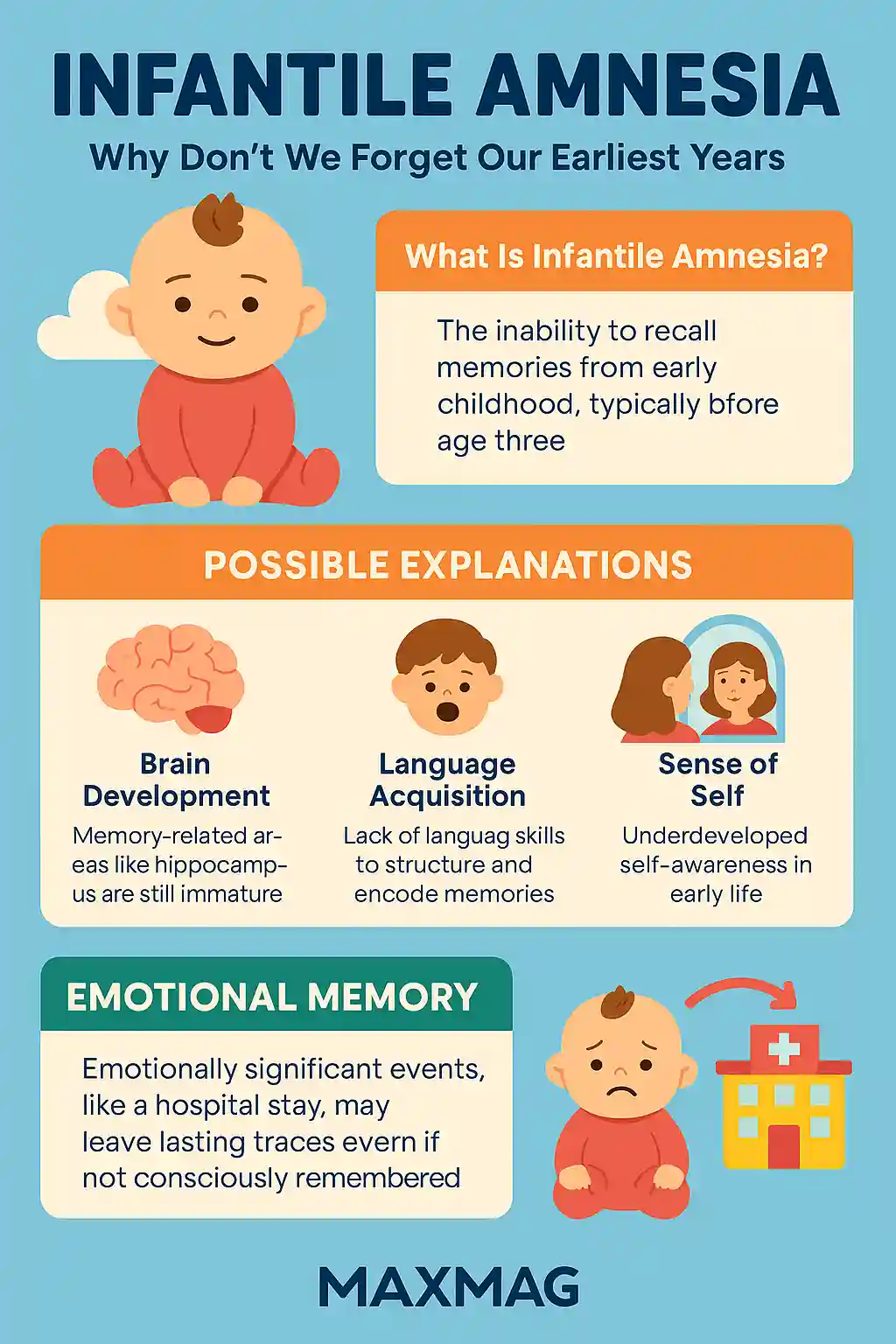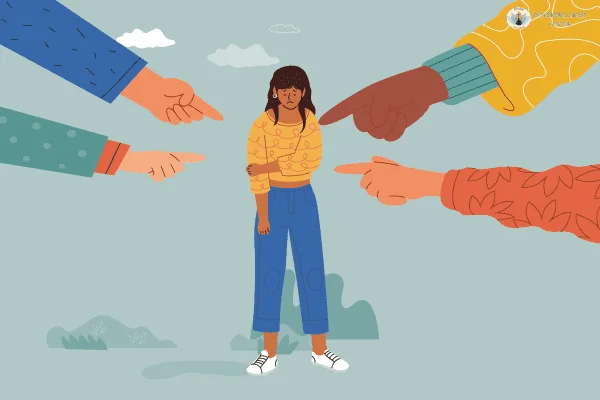
Have you ever wondered why you can’t remember being a baby? Why your memories seem to begin at age three or four, skipping over the entire experience of learning to walk, talk, or even your first birthday? This mysterious gap in our memory is not just common — it’s nearly universal. Known as infantile amnesia, this psychological phenomenon refers to the inability of adults to recall memories from the earliest years of life, typically before age 3.
Despite being a subject of research for over a century, infantile amnesia still surprises many with how little we know about its precise causes. It’s not because infants can’t learn or don’t experience life in meaningful ways. In fact, babies form impressions and store information. But the way memory functions in early development is profoundly different from how adults recall the past — and that difference holds the key to understanding how our mind matures.
In this article, we’ll explore what causes infantile amnesia, the role of language and identity in memory formation, recent scientific insights, and how these findings can impact parenting and education. Along the way, we’ll also link this phenomenon to broader psychological themes such as emotional memory and delayed gratification.
What Is Infantile Amnesia?
Infantile amnesia refers to the psychological inability to retrieve episodic memories from early childhood, particularly from birth to around 3.5 years of age. While people may recall isolated images or feelings from this period, detailed autobiographical memories are typically absent. The term was first coined in the late 19th century by Sigmund Freud, who associated the phenomenon with childhood repression. Modern psychology, however, provides more biologically grounded explanations.
The fact that nearly every adult experiences this memory gap suggests it is part of normal brain development. That makes infantile amnesia less of a disorder and more of a cognitive milestone — one that reveals how memory, identity, and language are constructed over time.
Memory Is Not Missing — Just Inaccessible
One of the most fascinating findings in developmental psychology is that infants do, in fact, form memories. Studies using visual recognition, facial tracking, and even operant conditioning show that babies remember faces, sounds, and tasks over time. For example, in one classic experiment, infants learned to kick their legs to move a mobile — and remembered the task a week later.
So why can’t adults retrieve these early experiences?
The prevailing view is that while early memories are encoded, they are stored in a form that becomes incompatible with the later memory system. The architecture of the brain changes so dramatically in the first few years of life that these early patterns become difficult, if not impossible, to access. The memories aren’t gone; they’re just out of reach — buried beneath layers of cognitive evolution.
The Brain’s Developmental Timeline
At the center of this discussion is the hippocampus, a brain structure critical to memory formation and retrieval. In newborns, the hippocampus is immature and lacks the full ability to process and store long-term declarative memories — the kind you consciously recall. As this part of the brain develops, the ability to create detailed autobiographical memories improves significantly.
Additionally, other brain regions like the prefrontal cortex, which governs organization and emotional regulation, are still under construction during infancy. These underdeveloped systems mean that even if memories are formed, they aren’t filed away with the clarity or complexity that adult memories require.
A 2020 study from the National Institutes of Health suggested that high rates of neurogenesis (new neuron formation) in infancy could actually disrupt existing memory circuits, effectively overwriting early information as the brain grows.
🧠 “Infantile amnesia isn’t just about forgetting — it’s about developmental pruning. Your brain is retooling for the future, not the past.” — Dr. Rachel Barr, Georgetown University
Language: Memory’s Organizing Principle
Another reason we experience infantile amnesia is the absence of language in the earliest stages of life. Memory is more than just sensory impressions — it’s narrative. Adults remember because we can structure events into stories. We describe experiences with language, creating a framework that helps us recall the past.
Infants, on the other hand, experience life without this verbal scaffolding. Although they may feel emotions or perceive events, they can’t yet encode them in a meaningful, retrievable way. As language develops, around age two, children begin to shape memories with labels, categories, and time concepts — laying the foundation for long-term retention.
Longitudinal studies show that toddlers with advanced language skills tend to retain earlier memories compared to peers with delayed speech. This suggests that developing verbal ability is a key transition point in emerging autobiographical memory.
The Role of Self-Identity
Beyond brain growth and language, another ingredient is critical for memory: the sense of self. Until children recognize themselves as independent individuals — usually around age two — they lack the internal framework necessary for autobiographical memory. Memory becomes meaningful when it’s linked to the concept of “me.”
This was famously demonstrated in the mirror test, where toddlers are marked with lipstick on the forehead and placed in front of a mirror. Those who try to wipe it off themselves are thought to possess self-recognition. Once a child understands they are distinct from others, they start storing events with a personal narrative — a crucial step in the evolution of memory.
Emotion and Memory: Not Everything Is Forgotten
Even though infants can’t recall events in detail, emotional memory often persists. That’s why a baby who had a painful experience in a hospital may cry when returning, even without conscious recall. Emotional memories are processed by the amygdala, which develops earlier than the hippocampus and stores emotional “tags” for later reference.
These emotional traces can subtly influence adult behavior. For example, adults may have irrational fears or intense preferences that stem from early experiences they can no longer remember consciously.
In some cases, trauma during infancy has been associated with long-term behavioral impacts, even if the events themselves are forgotten. This has implications for caregiving, adoption, and trauma-informed parenting strategies.
Cross-Cultural Perspectives on Early Memory
Interestingly, not all people experience infantile amnesia to the same degree. Research suggests that culture plays a role in when people begin to form their first memories. In Western societies, where storytelling and individual identity are emphasized, people often report earlier memories than those from collectivist cultures that stress group identity and social roles.
Parents who engage their children in conversations about past events — asking, “Do you remember when we went to the beach?” — help solidify memory structures. These exchanges teach children to encode and retrieve experiences in ways that persist into adulthood.
This finding encourages parents and educators to actively support memory-building through dialogue, photos, and routine storytelling.
Infantile Amnesia and Child Psychology
Understanding infantile amnesia is more than an academic exercise. It carries real implications for how we parent, teach, and even treat children.
-
Early experiences matter, even if not consciously remembered. Warmth, consistency, and security in the first years of life lay emotional and cognitive foundations.
-
Language exposure is critical. Talking to children from birth, narrating actions, and reading aloud all help scaffold memory.
-
Emotional memory is powerful. Children may respond to emotional environments — safe or unsafe — in ways that bypass conscious memory but shape long-term mental health.
These insights also dovetail with broader psychological studies, such as the Stanford Marshmallow Experiment, which demonstrated how early self-control predicts long-term outcomes. Like memory, delayed gratification hinges on mental modeling, future-oriented thinking, and emotional regulation — all capacities that evolve alongside the memory system.
New Research: Can We Recover Early Memories?
Some researchers believe it may be possible to retrieve forgotten early memories through cue-dependent recall or implicit memory exercises. These techniques involve exposing individuals to stimuli that resemble early environments, smells, or objects to evoke forgotten emotions or sensations.
While these methods do not produce vivid autobiographical recollections, they sometimes trigger flashes of sensation — the feeling of a crib, the smell of a parent, the warmth of a bath. These are not memories in the traditional sense, but they remind us that the early years are not truly lost — they live in the body, in the emotions, and in how we relate to the world.





